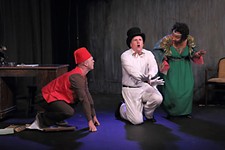Minus Tide
In the provocative new drama Minus Tide by Austin playwright Kimberly Burke, distance can make it hard to tell clouds from mountains and abuse from love
Reviewed by Robert Faires, Fri., June 2, 2006

Minus Tide
The Off Center, through June 10
Running Time: 1 hr, 15 min
As Allison the entomologist and Tim the soldier drive across the desert of some unnamed country, one of them describes objects on the horizon as "clouds that might be mountains or mountains that might be clouds." Depending on where you are, on your distance from a thing and perhaps a trick of the light, it can be hard to tell what the thing truly is. Shapes can be so similar, colors almost identical. What looks to be a rock might be insubstantial vapor or vice versa. You just can't always be certain that a thing is what it appears to be.
That's as true of relationships as it is of objects, as we come to discover in this new drama by Austin playwright Kimberly Burke. When she has her two protagonists cruising over the sands, they are still strangers thrown together by circumstance – Tim has been assigned to escort Allison to the remote area where she is to conduct some research on bugs – and neither is terribly pleased with the other. He feels she isn't taking the physical dangers of the trip seriously enough; she feels he's taking liberties with her in a physical sense. But the isolation and their proximity work their spell, and the two fall into each other's arms. From there, they become a couple, as we see in a series of epistolary exchanges that take place during two years when he is serving overseas in a war zone. In alternating monologues, they talk about how much they miss each other, how they ache to be reunited. And when finally they are, their embrace and the way each sensually sucks on each other's thumbs communicates a mutual hunger. But after they've been back together, we see them engage in strange little games, role-plays rooted in differences in status and levels of desire seething with currents of conflict and knotted sexual tension. The tension escalates by way of domination and humiliation until some threshold of physical danger is crossed.
Sex games involving domination and submission aren't exactly new, onstage or off-, but what we witness between Allison and Tim doesn't appear to be mere sexual stimulation. Based on what Burke has shown us of their relationship, particularly their enforced separation and the psychic fallout of Tim's wartime experience – which he describes as a thousand spiders crawling through his mind – the games that these people play play more like expressions of some deeply buried feelings that can't be unearthed any other way. That's also testimony to the care that director Ellie McBride and actors Liz Fisher and Colum Morgan have taken in crafting the characters of Allison and Tim in this co-production of Bayou Radio and the Rude Mechs. In the play's first section, they build the connection between the two with real deliberateness, taking us from initial friction to tentative friendliness to attraction in measured steps that then make the pair's frustrations and anxieties over their separation – strikingly visualized with Morgan's Tim in silhouette behind a freestanding screen door – credible. (The play's atmosphere is richly enhanced by Megan Reilly's lighting, Leilah Stewart's spare but ingenious set, and Robert Fisher's subtle but eerie sound.) We can buy Allison and Tim as a couple – and as a couple whose union has been so profoundly disturbed that they must seek out alternative ways of expressing their feelings.
That doesn't necessarily make their games any less disturbing. The curious personas they adopt – a stuttering hick and a contemptuous hillbilly housewife, two matronly widows – and the tangle of animosity and desire between them, the verbal cruelty, the eruption of force, the presence of a knife or pills to cast a shadow of death over them, all help to make these episodes unsettling. They come off as intentional cruelty, two people lashing out at one another, each degrading and being degraded by the other. And yet, despite this, something of Tim and Allison's earlier affection bleeds through, some trace of their love still echoes in our ears. Or seems to. As Minus Tide winds its way to an ending, we're left to question the nature of these lovers' actions. Are they assaults born out of frustration that's been twisted by circumstance into resentment and hatred? Or could they be desperate attempts at reconnecting their love, using the language of damage to pass beyond the damage they've suffered? Abuse or affection? We may be too far away to see clearly. Distance makes it hard to tell. Might be a cloud, might be a mountain.










